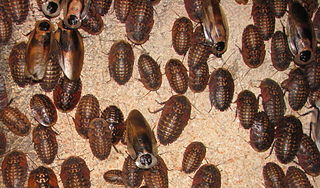
Giant cockroaches, or blaberids, are the second-largest cockroach family by number of species. Mostly distributed in warmer climates worldwide, this family is based on the American genus Blaberus, but much of the diversity is also found in Africa and Asia.
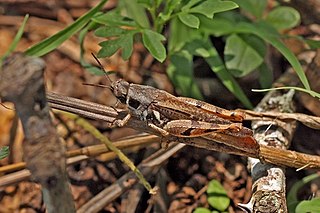
The subfamily Catantopinae is a group of insects classified under family Acrididae. Genera such as Macrotona may sometimes called "spur-throated grasshoppers", but that name is also used for grasshoppers from other subfamilies, including the genus Melanoplus from the Melanoplinae.

The grasshopper subfamily Acridinae, sometimes called silent slant-faced grasshoppers, belong of the large family Acrididae in the Orthoptera: Caelifera.
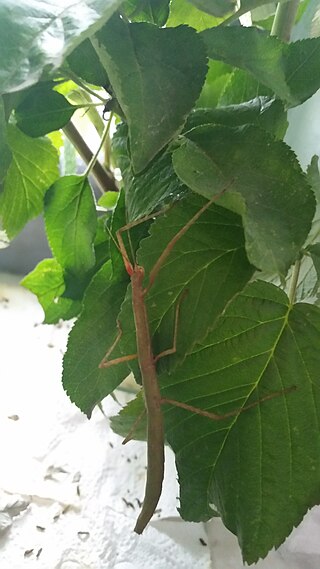
Carausius is a genus of the tribe Lonchodini, in the order Phasmatodea. The genus is in many ways typical of the Phasmatodea in that all species are twig-like in appearance. These species are parthenogenetic.
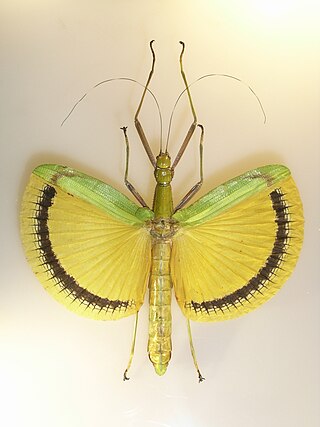
Necrosciinae is a subfamily of the stick insect family Lonchodidae, with its greatest diversity in South-East Asia.
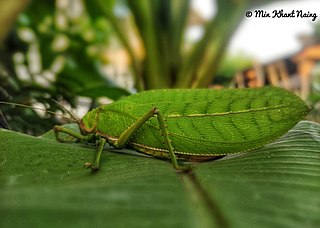
The subfamily Pseudophyllinae contains numerous species in the family Tettigoniidae, the katydids or bush crickets. Sometimes called "true katydids", together with the crickets of suborder Ensifera, they form part of the insect order Orthoptera which also contains grasshoppers.
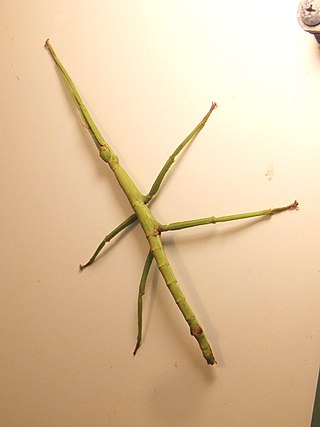
Pharnacia is a tropical Asian genus of stick insects in the family Phasmatidae and subfamily Clitumninae. Some species formerly placed in this genus have been reassigned to Phobaeticus.

The Phaneropterinae, the sickle-bearing bush crickets or leaf katydids, are a subfamily of insects within the family Tettigoniidae. They are also known as false katydids or round-headed katydids.

Ramulus is an Asian genus of stick insects in the family Phasmatidae and tribe Clitumnini.

Bacillidae is a stick insect family in the order Phasmatodea and the suborder Verophasmatodea.
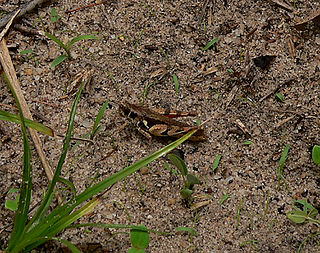
Catantopini is a tribe in the subfamily Catantopinae, a group of grasshoppers found in Africa, Asia and Australia.

The Clitumninae are a sub-family of stick insects in the family Phasmatidae found in Asia. The type genus Clitumnus is now considered a synonym of Ramulus.

The Lonchodinae are a subfamily of stick insects in the family Lonchodidae found in: Australasia, Asia, Africa, Southern America and the Pacific.
Tirachoidea is an Asian genus of stick insects in the family Phasmatidae and tribe Pharnaciini. Species have a known distribution from India, Indochina and West Malesia.

Lonchodidae is a family of stick insects, with more than 150 genera and 1,000 described species.

The Gratidiini are a tribe of stick insects based on the type genus Clonaria and first used by Cliquennois in 2005. Genera are known to be distributed in: Africa, Europe, temperate and tropical Asia and various Pacific Islands.

Platycraninae are an anareolate subfamily of stick insects in the family Phasmatidae. Their known distribution includes southern, southeast Asia and Australasia.

The Cladomorphinae are a subfamily of stick insects in the family Phasmatidae. This taxon is particularly well represented in the Neotropical region, but records also exist for Madagascar, Java and the Maluku Islands.

The Ommatolampidinae are a subfamily of grasshoppers in the family Acrididae, found in central and South America, and based on the type genus Ommatolampis. Derived from the "Ommatolampides" used by Brunner von Wattenwyl in 1893, the first use of the name in its current form was by Rodríguez et al. in 2013; this taxon appears to be paraphyletic.
Rhamphophasma is a genus of stick insects in the tribe Clitumnini, erected by Carl Brunner von Wattenwyl in 1893. Species have been recorded from: China, Vietnam, India, Myanmar and Japan.
This page is based on this
Wikipedia article Text is available under the
CC BY-SA 4.0 license; additional terms may apply.
Images, videos and audio are available under their respective licenses.


















